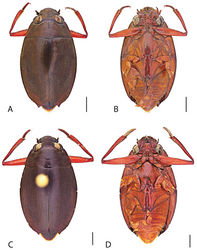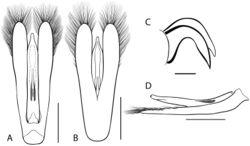Dineutus longimanus
| Notice: | This page is derived from the original publication listed below, whose author(s) should always be credited. Further contributors may edit and improve the content of this page and, consequently, need to be credited as well (see page history). Any assessment of factual correctness requires a careful review of the original article as well as of subsequent contributions.
If you are uncertain whether your planned contribution is correct or not, we suggest that you use the associated discussion page instead of editing the page directly. This page should be cited as follows (rationale):
Citation formats to copy and paste
BibTeX: @article{Gustafson2015ZooKeys, RIS/ Endnote: TY - JOUR Wikipedia/ Citizendium: <ref name="Gustafson2015ZooKeys">{{Citation See also the citation download page at the journal. |
Ordo: Coleoptera
Familia: Gyrinidae
Genus: Dineutus
Name
Dineutus longimanus (Olivier, 1791) – Wikispecies link – Pensoft Profile
Differential diagnosis
This is a very unique Dineutus species, easily distinguished from all other New World Dineutus, by the elytral apices possessing a spine located between the sutural and apicolateral angles. Serrations and irregularities are also present, and the sutural angle is also produced into a short spine. The venter is usually more lightly colored from reddish to yellow.
Distribution and subspecies
This species is endemic to the Caribbean and represents a bit of a population genetics and Caribbean biogeography problem. The species is currently divided into four subspecies, with each island of the Greater Antilles having its own subpsieces, with the two most unique subspecies being found at opposite ends of the species distribution (Cuba and Puerto Rico). The two subspecies occupying the middle area of the range (Jamaica and the Dominican Republic) are less distinct and seem to form a gradient between the morphologies of the two subspecies at the opposite ends. The aedeagi of three of the subspecies are very similar with only that of Dineutus longimanus portoricensis offering some significant differences. For these reasons we have decided to retain the classification proposed by Ochs (1924[1], 1926a[2], 1938[3]) in treating the four forms as subspecies. Future genetic work may shed some light on these issues.
Dineutus longimanus can be distinguished from all other North American species of Dineutus in having the elytral apices spinose with serrations and irregularities present. The subspecies can be separated by the following key:
Taxon Treatment
- Gustafson, G; Miller, K; 2015: The New World whirligig beetles of the genus Dineutus Macleay, 1825 (Coleoptera, Gyrinidae, Gyrininae, Dineutini) ZooKeys, (476): 1-135. doi
Images
|
Other References
- ↑ Ochs G (1924) On the West Indian Gyrinidae and a new species of Gyretes from northern Brazil. American Museum Novitates 125: 1–8.
- ↑ Ochs G (1926a) Die Dineutini. 2. Tribus der Unterfamilien Enhydrinae Fam. Gyrinidae (Col). A. Aligemeiner Teil. Entomologische Zeitschrift 40: 129–140.
- ↑ Ochs G (1938) Additional remarks on West Indian Gyrinidae. Psyche 45: 85–93. doi: 10.1155/1938/37837







